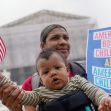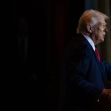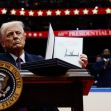A federal judge on Thursday blocked the Trump administration from enforcing its controversial birthright-citizenship executive order, a significant setback for a policy that would deny citizenship to certain children born in the United States. This executive order, issued on Inauguration Day, intended to deny automatic citizenship to children born in the U.S. unless at least one parent was a U.S. citizen or a permanent legal resident.
U.S. District Judge Joseph Laplante, presiding in New Hampshire, ruled the injunction would apply specifically to children born since February 20 whose citizenship would otherwise be jeopardized by the executive order. The decision provides temporary protection for these children, pending further legal action.
In his ruling from the bench, Judge Laplante granted immigration rights attorneys' request to certify a nationwide class consisting exclusively of individuals denied citizenship under Trump's executive order. He also issued an indefinite preliminary injunction, barring enforcement of the order against any child born after February 20.
The challenge was brought by three immigrant plaintiffs—a pregnant woman, a woman who gave birth in April, and a father whose child was born in March—arguing the order violates the Fourteenth Amendment of the U.S. Constitution. The amendment explicitly states, "All persons born or naturalized in the United States, and subject to the jurisdiction thereof, are citizens of the United States." This clause has historically guaranteed citizenship at birth to nearly all children born on U.S. soil, excluding only those born to foreign diplomats.
The Trump administration's legal defense rests on the argument that the Fourteenth Amendment was originally intended to ensure citizenship for Black Americans following emancipation, not for the children of immigrants without permanent legal status. However, this interpretation is disputed by legal experts and constitutional scholars, who emphasize longstanding judicial precedent interpreting the amendment more broadly.
Judge Laplante, appointed by former President George W. Bush, delayed enforcement of his injunction for seven days, allowing the administration time to appeal the decision.
The injunction comes in the wake of a recent Supreme Court ruling that limited the scope of nationwide injunctions in similar challenges. The high court suggested class-action suits as potential alternatives to nationwide injunctions, but left open the possibility that states could still seek nationwide remedies to avoid inconsistent judicial rulings.
Although the Supreme Court paused the executive order from taking immediate effect, that ruling did not address the fundamental legality of the policy, leaving the door open for further litigation. The Supreme Court’s temporary pause, which expires in late July, allowed Judge Laplante’s injunction to become especially crucial for protecting the affected individuals.
The Battle Over Birthright Citizenship: A Timeline of Trump's Executive Order
President Donald Trump's controversial executive order aimed at limiting birthright citizenship has set off a significant legal and political firestorm. Here is a timeline of key events since the signing of the order:
January 20, 2025 – Executive Order Signed
On his second inauguration day, President Trump signed an executive order restricting birthright citizenship. The policy stipulated that children born in the United States would not automatically gain citizenship unless at least one parent was either a U.S. citizen or a permanent legal resident.
February 20, 2025 – Effective Date of the Order
The Trump administration announced the order would apply to all children born in the U.S. starting from this date.
March 2025 – Immediate Legal Challenges Filed
Multiple lawsuits emerged, challenging the legality and constitutionality of the executive order. Plaintiffs included immigrants directly affected by the policy, as well as civil rights organizations.
April 2025 – Additional Cases and Growing Opposition
Further lawsuits and amicus briefs flooded federal courts, citing violations of the 14th Amendment, which guarantees citizenship to anyone born on U.S. soil and subject to its jurisdiction.
June 2025 – Supreme Court Limits Nationwide Injunctions
In a separate but related legal action, on June 27, 2025, the Supreme Court limited the authority of federal judges to issue nationwide injunctions against executive policies. However, the justices indicated that class-action suits or state-level suits could still provide nationwide relief, leaving room for broader legal challenges.
July 2025 – U.S. District Court Blocks Enforcement
On July 10, 2025, Judge Joseph Laplante of the U.S. District Court in New Hampshire issued an injunction blocking enforcement of the executive order. Laplante ruled that the order could not be enforced against children born after February 20, providing temporary legal protection for affected families.






